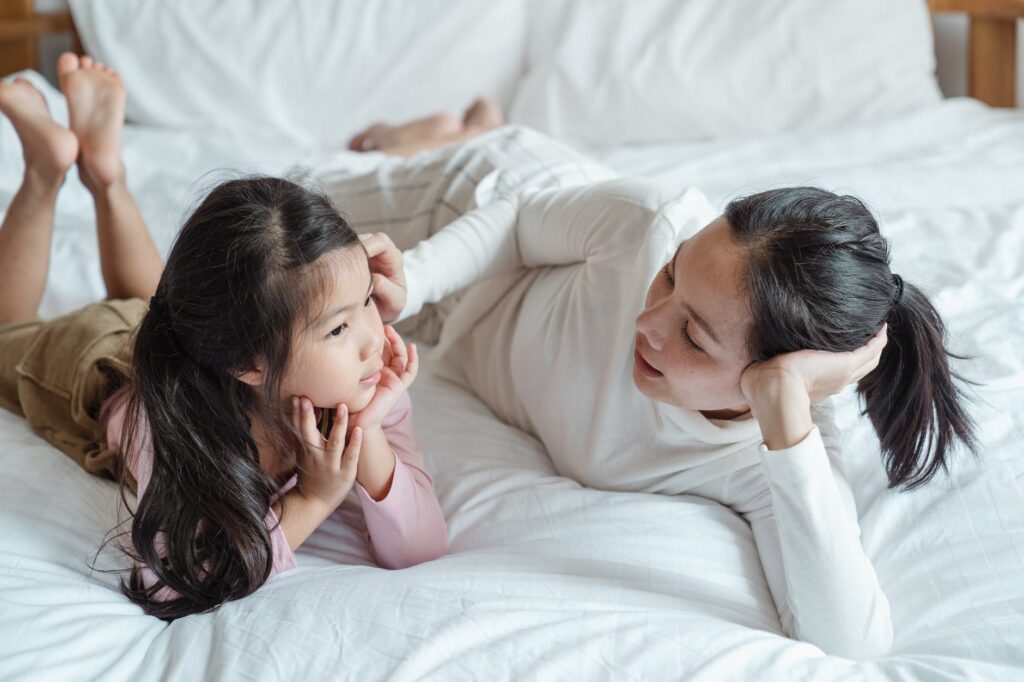Gentle parenting, with its superpower of communication, offers an empathetic, supportive, and effective way to help our young ones navigate their fears and anxieties. Today, we’re going to explore three specific techniques that embody this compassionate philosophy.
The Power of Conversation: A Double-Edged Sword
Let’s start with the core strength of gentle parenting – talking. It’s a powerful tool that enables us to connect with our children, understand their world, and help them process their emotions. However, when it comes to anxiety, we can sometimes inadvertently heighten their fears by focusing too much on the subject.
Imagine you’re in a situation that triggers your anxiety. Constantly discussing your fears can reinforce those emotions, keeping you fixated on them instead of allowing you to move forward. The same happens with our children. While it’s essential to acknowledge their feelings, we must avoid over-processing.
The key is balance. We should provide a space for our kids to express their fears without making their anxiety the center of attention all the time. By doing so, we allow them to understand that while their fears are valid, they don’t have to dominate their experiences.
Encouragement Over Fixation: Fostering Resilience
Now, let’s talk about how we can better support our children as they face their anxieties. Instead of fixating on the fear, let’s shift our focus to empowerment and resilience. Tell your child, “I know you’re afraid, but I also know you can handle it. I’ll be there with you every step of the way.”
This statement does two things: it acknowledges the fear, so your child feels heard, and it instills confidence, reminding them of their inner strength. It’s a subtle but powerful change in approach that can make a significant difference in how they manage anxiety.
By affirming their capability to overcome challenges, we’re not dismissing their feelings. Instead, we’re guiding them towards a mindset where they see themselves as capable and resilient, which is crucial in developing long-term coping skills.
Building Coping Skills: A Guided, Yet Subtle Approach
Finally, let’s consider how we can help our children build their coping skills without making them overly conscious of their anxiety. It’s essential to teach them techniques like deep breathing, visualization, or grounding exercises, but we must introduce these tools in a way that feels natural and non-intrusive.
For instance, practice deep breathing exercises together during calm moments, not just when they’re anxious. This way, it becomes a part of their routine, and they’re more likely to remember to use it when they need it – without you having to remind them in the midst of their anxiety.
Incorporate these techniques into daily life as much as possible. The goal is for these skills to become second nature to them, so when they do face a situation that causes anxiety, they have a toolkit of strategies already in place, ready to use without it feeling like a big deal.
In conclusion, gentle parenting offers a compassionate framework for helping children and teens manage their anxiety. By conversing thoughtfully, fostering resilience, and subtly integrating coping skills into everyday life, we can empower our young ones to face their fears with confidence. Remember, it’s about guiding them to understand that while anxiety is a part of life, it doesn’t have to define their experiences. As parents, our unwavering support and belief in their abilities can make all the difference.
Thank you for joining us on this journey towards understanding and nurturing our children’s emotional well-being. Keep embracing the power of gentle parenting, and let’s continue to create a supportive environment where our kids can thrive, even in the face of anxiety.



